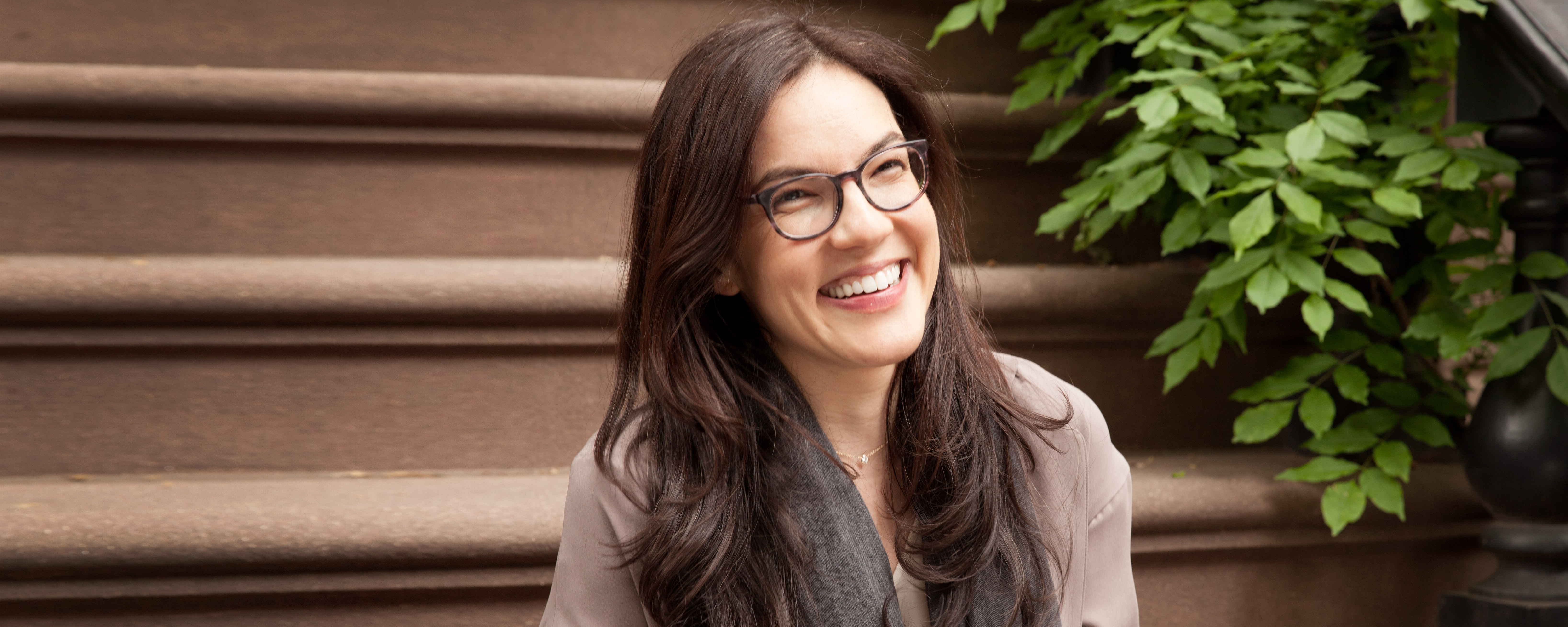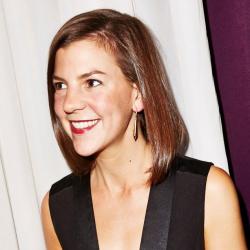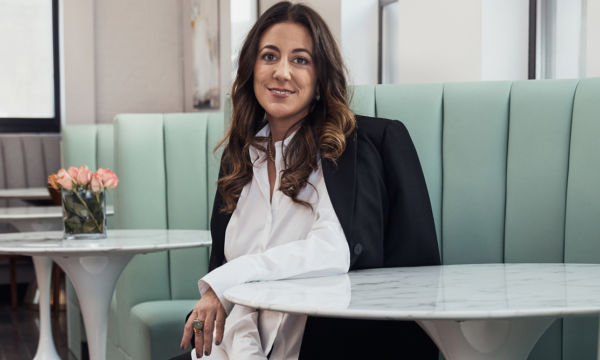Author Sloane Crosley on Balancing Two Careers—Then Finally Quitting Her Day Job
June 09, 2016 | Filed in: Woman of the Week
Sloane Crosley was a 29-year-old publicist at Random House when her first collection of personal essays, I Was Told There’d Be Cake, hit the New York Times bestseller list in 2008. The Observer famously crowned her “The Most Popular Publicist in New York,” although everyone figured it was only a matter of time before she quit her PR gig—especially when her book was optioned for an HBO series. But it wasn’t until her second book, How Did You Get This Number, achieved similar success in 2010 that Crosley finally ditched her day job for the supposed joys of typing on her sofa all day, a transition she calls “terrifying.” Still, the move proved fruitful: She produced her first novel, The Clasp, to critical and popular acclaim last year. Over coffee near her West Village apartment, she spoke with us about the symbiosis between her two careers, the pitfalls of freelance life (so much toilet paper!), and why it took so long to work up the courage to write full-time.
Plenty of people aspire to do something creative in addition to their day job, but few succeed in building a second career out of it. What drove you to write?
You just have to listen to the little part of you that won’t shut up. What do you really want to do with your spare time, and what do you think about when you clear your mind and take a walk? Whatever your dream career is, it shouldn’t start as a slog—with some exceptions, like, say, heart surgery and bomb dismantling. You should enjoy it, and it should be bursting out of you. Of course, just like any other job, it doesn’t stay that way all the time. It can be arduous, and draining, and depressing, and frustrating. But you get through all that if you love it enough.
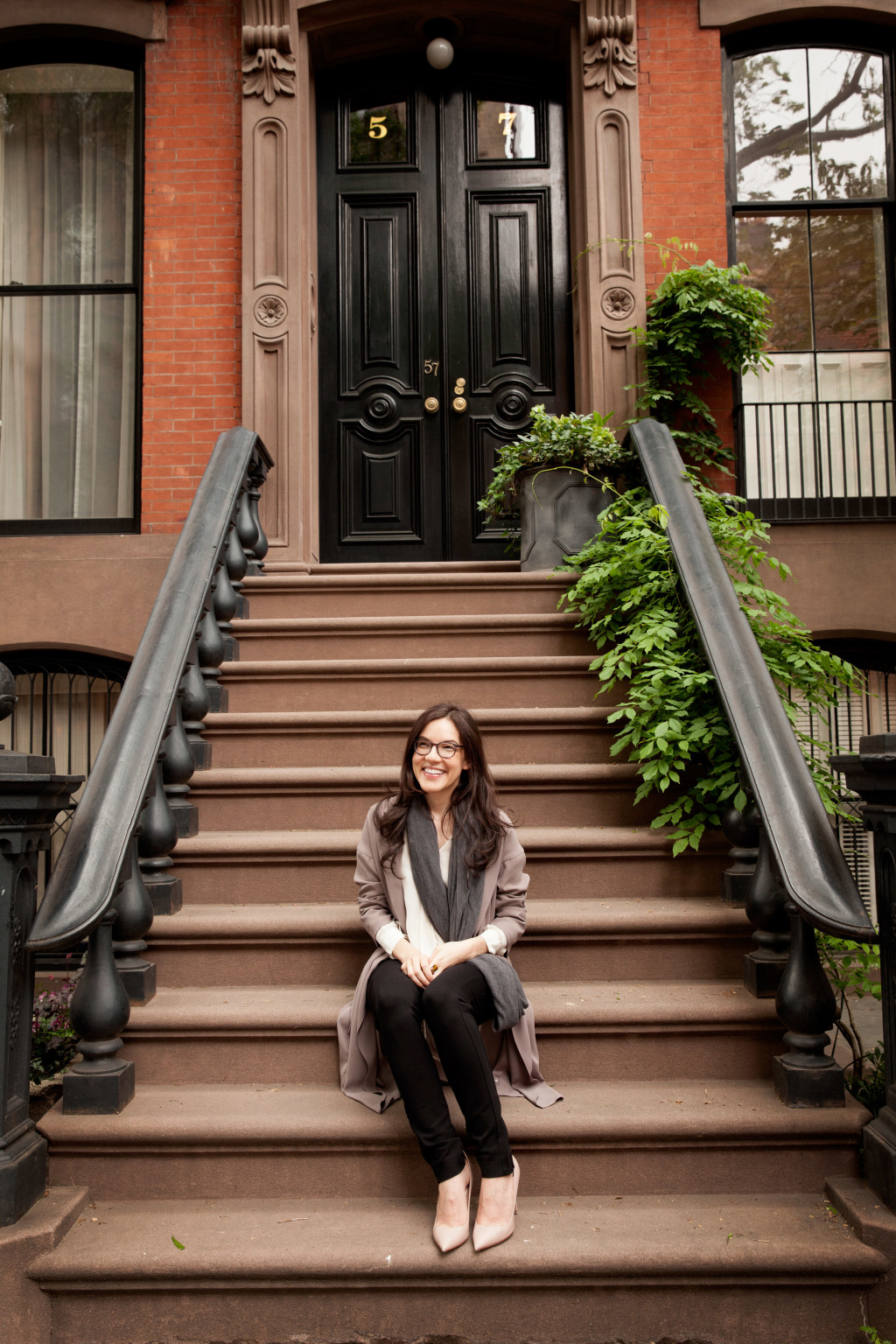
Sloane in the McCarren trench.
How did your writing career start?
At the very beginning, when I was a baby in my early twenties, I did a few magazine pieces that weren’t even credited. Then I started writing for the Village Voice in 2004, and eventually they gave me a column. At first, doing that on the side was actually quite helpful for my job in book publicity, because it helped me understand what editors look for. There’s a big sea of publicists who are all very bright, but having the column taught me to have articulate opinions about things, which lent a certain freedom to my pitches.
How did the success of your first book impact your job?
Even after I got the book deal for I Was Told There’d Be Cake, I still considered my publicity job to be the main entree of my day, because a) it took up so much time, and b) it gave me my salary and health insurance. At the time, everyone believed that essays didn’t sell, so I didn’t have high expectations. Now, personal essays are incredibly popular, especially ones by women. In terms of reinventing the wheel, I haven’t done much—I maybe changed one sprocket—but something about I Was Told There’d Be Cake struck a chord with people, and it became a bestseller. But I never felt that I needed to shed this skin of working in book publishing to become a writer.
How much did your literary contacts from your job help with your books?
I used some of my contacts, but it’s not as easy as people think it is. In many cases, it was actually a hindrance, because no one in the media wants to look like they’re just helping their friends. When my first book came out, a reporter asked me, “What do you say to people who say you used your connections to get published?” And I kind of snapped at him—which isn’t always an effective thing to do with someone who’s recording you. I basically said, “If you want to be someone’s bitch—act as the travel agent for a bunch of authors, be at their beck and call, and fight for an art form in a dying industry for ten years—all in the hope that you get your own book published one day, then have at it!” Of course, it felt like a real honor to do what I did for a living, which is essentially be a Lorax for books. I got to work with great authors and talk to some of the smartest editors at brilliant publications. But it can also be a very thankless job, and I was always irritated by the outside perception that I had this fancy life and all these contacts who helped me out, because in truth, editors are less likely to review a book if it’s a conflict of interest. I still have a strangely complex relationship with my old work world.
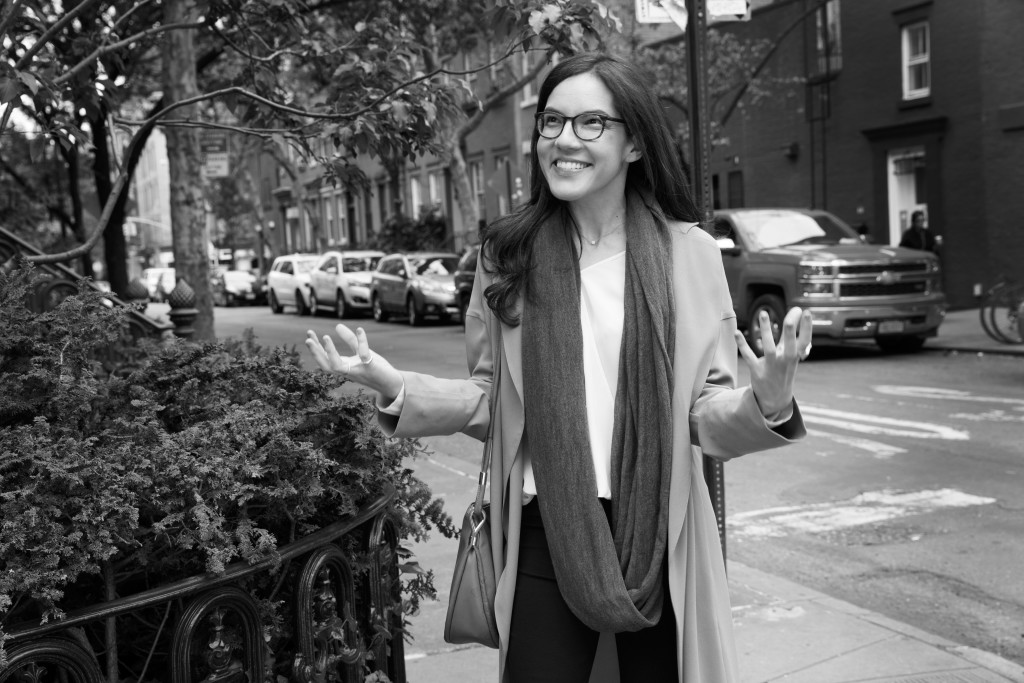
Sloane in the McCarren trench and infinity scarf in charcoal (coming late summer).
It seems like your job did provide you with useful fodder for your books, though.
Yes, my career and my writing informed each other. Still, part of me wonders if my literary career evolved more slowly than it might have if I’d never had a day job—well, not just a day job, but a 12-year career in book publishing. When left Knopf/Vintage, I printed out every press release I’d ever written there, in case I might need them someday; at that point I’d published two books, and here was this pile of almost 300 press releases. I showed them to my boss and was like, “Well, that’s where the third book went.” It was a joke, but it had a grain of truth.
What are some other ways that your job helped your writing?
I write very well under stress and pressure, which is normal, but I don’t do well under anxiety, and the idea of not knowing when my next paycheck is coming is sort of unthinkable to me. When people started asking me why I didn’t quit my job, I always wanted to say, “Because I can’t pay my rent, or sleep soundly on a mattress made of ‘Oh, that’s awesome!’” Financial concerns are boring, but after agents’ fees and taxes, I think I made about 80 cents for every copy of my first book that ever sold. So I had a healthy paranoia about money, and having a job helped me feel secure. Also, I’ve always liked structure. If you have all the time in the world to do something, it’s enough rope to hang yourself, and it suddenly takes you two days to write a 500-word article instead of a few hours before work in the morning.
At what point did you start to consider quitting your job to write full-time?
I hoped to do both jobs forever, but at a certain point, it became untenable. At first, there were these halcyon days when the writing was helping the day job, and it was a symbiotic relationship. But it eventually became very stressful, and I felt like the only one watching the throne. I couldn’t miss a deadline with my publisher because I had to go to an author event or write a press release or make a dozen pitch calls for someone else. And similarly, the authors I was working with certainly couldn’t give me leeway for dropping the ball on their books because of my own writing. It got to the point where I was taking all my vacation days to go on my own book tour, and the overlap between the two was getting weird. As a publicist, I’d make a phone call to an editor and say, “Would you like to review this collection of Icelandic short stories, with an introduction by this other famous author?” And the editor would say, “No thanks. When’s your next book coming out?” That’s an incredibly awkward position to be in. So my decision to quit was a slow worm in the brain—a gradual build, rather than a clear breaking point.
How was the transition?
I didn’t have a book deal when I quit, but I had published two books, and I had a column gig, and I felt that I was finally willing to roll the dice on myself. Still, it was terrifying. I’d never worked freelance before in my life, and everyone was like, “Oh my god, how much are you loving it?” And the truth was not at all, at first. I was so lost and spinning. There’s a character in my novel, Victor, who gets very depressed after getting fired from his job, and there were moments of his experiences at home all day that were taken from mine directly. Like, sometimes he would stay inside and only notice it was raining because his mail was wet—yeah, that was me. Or he’d realize that he was plowing through an unusual amount of toilet paper, because he used to spend eight hours a day using the office’s toilet paper—a little graphic, sure, but these are the little things you start noticing. I made rules for myself, to have the structure that my job had given me previously—like, “get up early to write”—but I break my rules all the time. When you don’t have a traditional job, you have to define your own success in a new way. And by the way, now I love it.
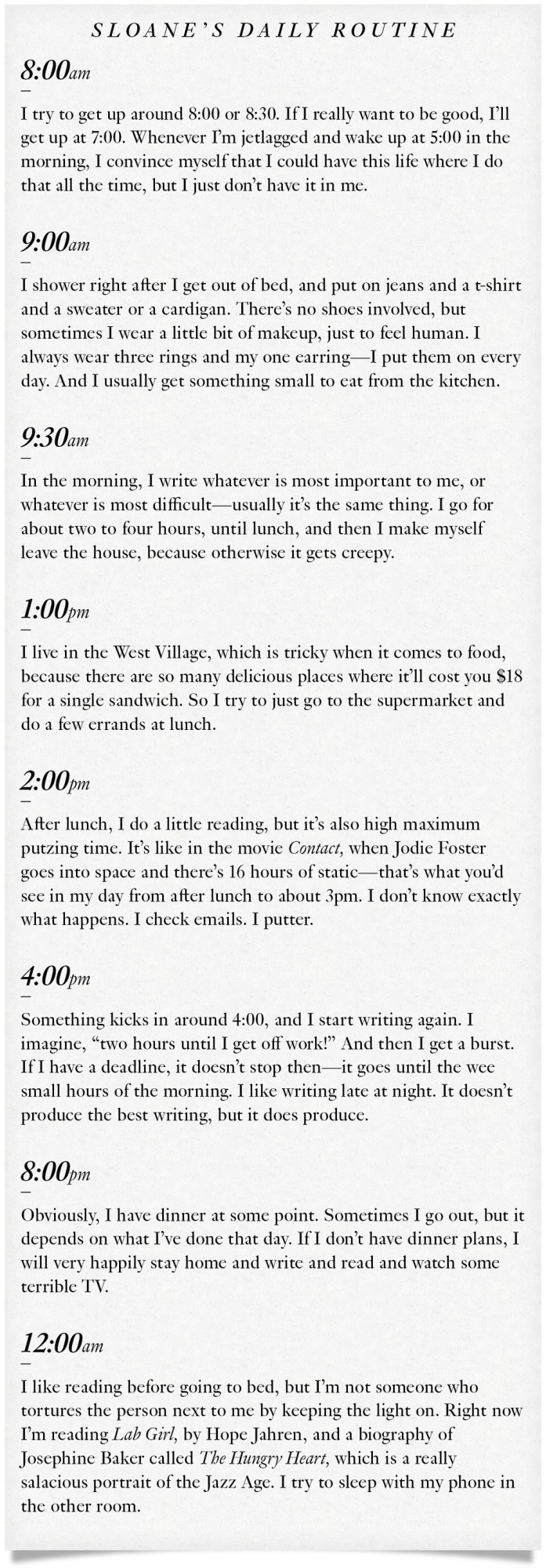
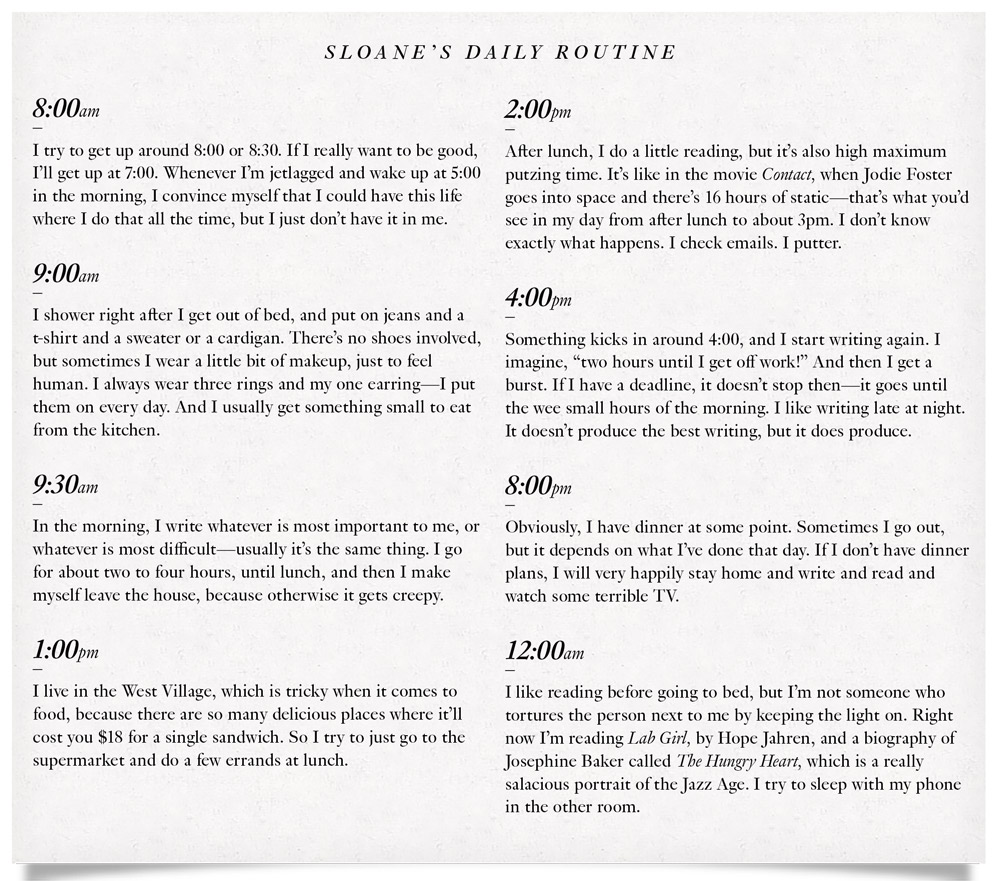
You mentioned rules—what are some other ways that you impose structure on your day?
The structure of my day almost works in the negative, in terms of what I’m not allowed to do. I can’t do things during the week that I do on weekends—it causes me great anxiety and agita. It helps to superimpose my former life over my new one: I won’t drop off laundry and pick up dry cleaning during the afternoon, because I wouldn’t have done that when I was working at Random House. I can’t stretch my schedule too far. When you have distant deadlines, you have to get accustomed to turning on your own engine every day, because otherwise, there’s really nothing to stop you from eating cheese doodles in bed all morning. I could do nothing tomorrow, and technically nothing bad would happen—but something would, because I would lose the momentum I’m building on this big project that I eventually need to hand in.
What do you do when you hit a wall?
I walk. Depending on how high the wall, it’s usually just around the block, but if it’s really awful, I’ll walk along the West Side Highway down to Tribeca or up to 34th Street. Another tactic is to read an author that I really admire, like David Rakoff or Jennifer Egan or Don DeLillo. Sometimes you get so incapacitated that you don’t even remember what a good book looks like, and it helps to read—not to imitate, but just to remember what realm your finished product is supposed to land in. It needs to be of this century, though. I’ve found that going through Dickens doesn’t help me; it just intimidates me and furthers the paralysis.
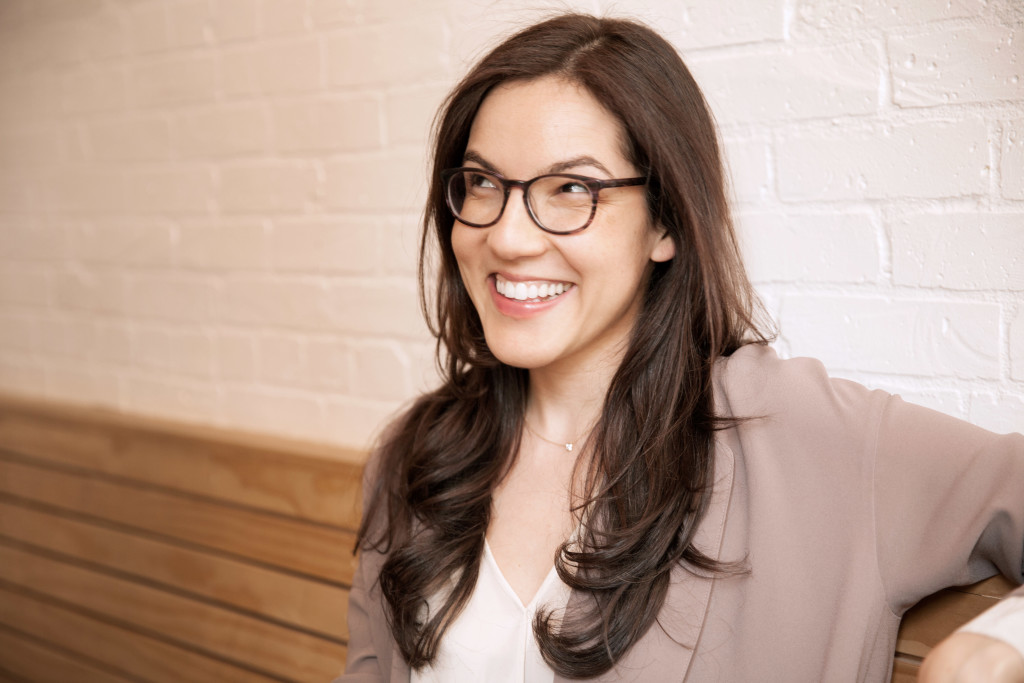
Sloane in the single bezel necklace in yellow gold.
Financial matters aside, would you encourage a young artist to have a day job?
I think it does help, especially if you’re a very young person. You might not necessarily be in want of talent, but you’re in want of something to observe—you’re probably not going to accomplish much sitting in a cabin in the woods of New Hampshire as a 20-year-old. Maybe you’re the second coming of Walt Whitman, but even he had things to do. While you figure out your calling and get to know yourself, you might as well pay your rent.
Sloane Crosley’s novel, The Clasp, is now available in paperback.





